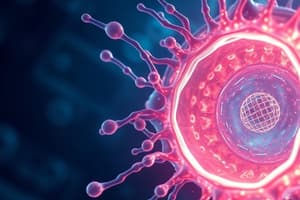Podcast
Questions and Answers
Which process is essential for growth, repair, and reproduction?
Which process is essential for growth, repair, and reproduction?
- Cell division (mitosis) (correct)
- Biotechnology
- Cell signaling
- Cell adhesion
What is the main difference between prokaryotic and eukaryotic cells?
What is the main difference between prokaryotic and eukaryotic cells?
- Ability to perform cell division
- Presence of a nucleus and membrane-bound organelles (correct)
- Transmission of electrical signals
- Formation of tissues and organs
What is the primary function of cell signaling?
What is the primary function of cell signaling?
- Formation of tissues and organs
- Selective permeability and secretion
- Transmitting electrical signals
- Communication and response to the environment (correct)
What is the main function of epithelial cells?
What is the main function of epithelial cells?
Which field applies our understanding of cell biology to improve health and agriculture?
Which field applies our understanding of cell biology to improve health and agriculture?
What is the primary function of the cell membrane?
What is the primary function of the cell membrane?
Which component of a plant cell is responsible for the process of photosynthesis?
Which component of a plant cell is responsible for the process of photosynthesis?
What is the energy currency of cells?
What is the energy currency of cells?
Which structure in a cell contains proteins that facilitate the production of ATP?
Which structure in a cell contains proteins that facilitate the production of ATP?
What are the main components of the cell membrane?
What are the main components of the cell membrane?
Who formulated the famous Maxwell's equations that unify electricity and magnetism?
Who formulated the famous Maxwell's equations that unify electricity and magnetism?
Which branch of physics studies the behavior of systems at the macroscopic level, including their thermal properties and statistical mechanics?
Which branch of physics studies the behavior of systems at the macroscopic level, including their thermal properties and statistical mechanics?
Who laid the foundations of classical mechanics with his laws of motion and law of universal gravitation?
Who laid the foundations of classical mechanics with his laws of motion and law of universal gravitation?
Which physicist formulated the famous equation $E=mc^2$?
Which physicist formulated the famous equation $E=mc^2$?
Who introduced the concept of the Carnot cycle, laying the foundations for modern thermodynamics?
Who introduced the concept of the Carnot cycle, laying the foundations for modern thermodynamics?
Which experiment led to the development of Einstein's special relativity, supplanting Newtonian mechanics?
Which experiment led to the development of Einstein's special relativity, supplanting Newtonian mechanics?
Who proposed a nuclear model of an atom consisting of a dense nucleus surrounded by electrons orbiting in shells?
Who proposed a nuclear model of an atom consisting of a dense nucleus surrounded by electrons orbiting in shells?
Which theory explains the behavior of objects moving at constant speeds and challenges Newtonian mechanics by introducing the concept of time dilation and length contraction?
Which theory explains the behavior of objects moving at constant speeds and challenges Newtonian mechanics by introducing the concept of time dilation and length contraction?
What did the discovery of the cosmic microwave background radiation provide compelling evidence for?
What did the discovery of the cosmic microwave background radiation provide compelling evidence for?
Who proposed the Higgs mechanism that explains the origin of the Higgs boson, giving particles mass?
Who proposed the Higgs mechanism that explains the origin of the Higgs boson, giving particles mass?
Study Notes
Unraveling the Wonders of Cell Biology: A Comprehensive Guide
Cell biology, a fascinating and foundational branch of biology, concerns itself with the intricate inner workings of the cell, the basic building block of all living organisms. In this educational article, we dive into the realm of cell biology, explore essential subtopics, and reveal the mysteries hidden within the tiniest parts of life.
1. Cell Structure
At the core of cell biology lies the cell's structure, which includes the cell membrane, nucleus, protonoplast, and cytoplasm. Each component plays a vital role in the cell's function, offering protection, energy storage, genetic information, and the space for essential biochemical reactions.
2. Cell Membrane
The cell membrane, also known as the plasma membrane, acts as a protective barrier and selective gatekeeper. It allows the controlled passage of molecules in and out of the cell while maintaining the cell's shape and integrity. The cell membrane is composed of lipids, proteins, and carbohydrates, and its fluidity enables the diffusion of small molecules.
3. Protonoplast
The protonoplast, a specialized cell membrane found in plant cells, contains chloroplasts and is responsible for the process of photosynthesis. It is composed of two membranes: the inner membrane and the outer membrane. The inner membrane houses proteins that facilitate the production of ATP, the energy currency of cells.
4. Prokaryotic and Eukaryotic Cells
Cells are classified as either prokaryotic or eukaryotic. Prokaryotes, such as bacteria and archaea, lack a nucleus and membrane-bound organelles. Eukaryotes, like plants, fungi, and animals, possess a nucleus and membrane-bound organelles, granting them greater complexity and functionality.
5. Cell Division
The process of cell division, or mitosis, is essential for growth, repair, and reproduction. During mitosis, the cell's DNA replicates, and the cell membrane breaks down into two identical halves, dividing into two daughter cells.
6. Cell Signaling
Cell signaling is the process by which cells communicate with one another and respond to their environment. Cells receive signals from outside the cell, convert them into a language understood by the cell, and subsequently perform relevant actions.
7. Cell Adhesion
Cell adhesion, a vital aspect of cell biology, concerns the interaction between cells and the extracellular matrix. By adhering to one another and the matrix, cells form tissues and organs, providing structural support and allowing for communication and coordination.
8. Epithelial Cells
Epithelial cells form the lining of body cavities and organs, offering protection, selective permeability, and secretion. They come in various shapes (e.g., squamous, cuboidal, and columnar) and aid in the absorption of nutrients and waste removal.
9. Neurons
Neurons, the building blocks of the nervous system, transmit electrical signals called action potentials. Neurons communicate with one another through synapses, and their elaborate connections form the basis for complex behaviors and thought processes.
10. Biotechnology
Biotechnology, a rapidly growing field, harnesses the power of cell biology to solve complex problems and create novel products. From gene therapy to recombinant DNA technology, biotechnology applies our understanding of cell biology to improve health and agriculture.
In conclusion, cell biology unravels the intricate mechanisms within the cell, providing crucial insights into the fundamental processes of life. The subtopics explored here represent only a fraction of the vast landscape of cell biology, yet they provide a solid foundation for a deeper understanding of the marvels of life. As we continue to study and explore the mysteries of cell biology, the potential for advancements in medicine, agriculture, and technology is boundless.
Studying That Suits You
Use AI to generate personalized quizzes and flashcards to suit your learning preferences.
Description
Explore the foundational aspects of cell biology, from cell structure and membrane to cell division, signaling, and biotechnology. Gain insights into the intricate inner workings of cells and their significance in life processes.




